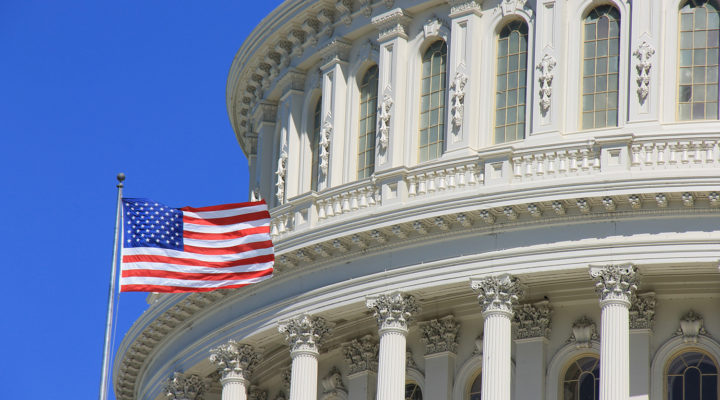The Southern Baptist Convention will cut ties with the District of Columbia Baptist Convention unless D.C. Baptist leaders confront a member church with lesbian co-pastors, the SBC Executive Committee warned during Feb. 19-20 meetings in Nashville, Tenn.
The move would end the D.C. convention’s more than a century of dual affiliation with Southern Baptists and the American Baptist Churches USA, intended as a unity message that turf on the nation’s capital belongs to all Americans.
The symbolism expanded to a triple alignment in 1997, when the D.C. convention voted to align with the predominantly black Progressive National Baptist Convention, and later to quadruple when D.C. Baptists joined the Baptist World Alliance.
According to Baptist Press, the Southern Baptist leadership group approved a substitute motion giving the District of Columbia Baptist Convention 90 days to secure removal of churches “that have demonstrated a faith or practice affirming, approving or endorsing homosexual behavior.”
The original motion would have called for severing ties immediately, citing the “continued relationship between the DCBC and Calvary Baptist Church, Washington, D.C., and how that relationship may disaffect having a continued relationship between the DCBC and the Southern Baptist Convention.”
Calvary Baptist Church, a 155-year-old congregation founded by abolitionists, severed ties with the SBC in 2012. After the church hired Maria Swearingen and Sally Sarratt in 2017, however, Southern Baptist leaders said by failing to act, the D.C. convention tacitly approved the calling of married lesbian co-pastors by a member church.

Robert Cochran
Robert Cochran, executive director of the D.C. convention, spoke in a committee open to media on background rules that forbid direct quotes or attribution. After the vote, he released his comments, saying he was prepared to repeat them on the record in a plenary session if asked.
Cochran, the convention’s former associate executive director who assumed the top post in 2015, said D.C. Baptists have a long-standing practice of granting churches the choice of affiliation with either northern or southern Baptists, which went their separate ways over slavery in 1845.
Cochran said the District of Columbia Baptist Convention “has not affirmed, approved or endorsed homosexual behavior in any way at any time” and “respects the official statements” on homosexuality by both American and Southern Baptists.
The SBC amended its constitution in the 1990s to exclude churches that “act to affirm, approve or endorse homosexual behavior.” American Baptist Churches USA is on record as declaring “the practice of homosexuality” incompatible with Christian teaching but recognizing “a variety of understandings” on the topic across the denomination.
The D.C. convention traces its history to an anti-missionary controversy that prompted several churches to leave the Baltimore Baptist Association started in 1793. In 1877, six Washington churches formed the Columbia Association of Baptist Churches. The association took the name District of Columbia Baptist Convention in 1934.
Luther Rice, a Baptist minister whose fund raising for missionaries helped build the Triennial Convention, predecessor to both American and Southern Baptists, founded Columbian College, now George Washington University, in Washington, and published The Columbian Star, a Baptist newspaper that survives today online as the Christian Index in Georgia.
In 1920, Texas minister George W. Truett preached a famous sermon on religious liberty on the east steps of the U.S. Capitol at the invitation of Baptists in the District of Columbia. The Southern Baptist Convention’s historic 1995 resolution apologizing for slavery was modeled after a resolution previously adopted by the D.C. Baptist Convention.
The relationship with Southern Baptists has eroded in recent years. In 2002, the SBC North American Mission Board ceased funding for the D.C. convention, citing its involvement in interfaith dialogue and cooperation with Baptist groups more liberal than the SBC. The loss of $475,000 out of a $1.5 million budget prompted job losses when programs were eliminated at the DCBC headquarters.
Citing concerns about overrepresentation, the SBC in 2013 combined the District of Columbia with Maryland and Delaware as a “defined territory” for purpose of representation on denominational boards.
According to Baptist Press, just seven of 149 churches in cooperation with the District of Columbia Baptist Convention give money to the SBC. Executive Committee records credit D.C. Baptists with Cooperative Program gifts in 2016 totaling $20,153, compared to $309,159 in 2006.
The final severing of ties, Baptist Press reported, would disqualify the District of Columbia Baptist Convention from receiving and disbursing funds through the Cooperative Program, a unified spending plan in place since 1925 that allows churches to contribute to both the national SBC and their respective affiliated state convention with the convenience of a single check.


